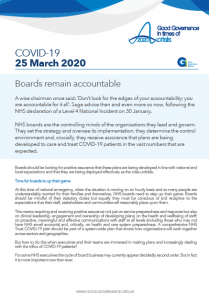Boards remain accountable
25 March 2020

A wise chairman once said: ‘Don’t look for the edges of your accountability; you are accountable for it all’. Sage advice then and even more so now, following the NHS declaration of a Level 4 National Incident on 30 January
NHS boards are the controlling minds of the organisations they lead and govern. They set the strategy and oversee its implementation, they determine the control environment and, crucially, they receive assurance that plans are being developed to care and treat COVID-19 patients in the vast numbers that are expected.
Boards should be looking for positive assurance that these plans are being developed in line with national and local expectations and that they are being deployed effectively as the crisis unfolds.
Time for boards to up their game
At this time of national emergency, when the situation is moving on an hourly basis and so many people are understandably worried for their families and themselves, NHS boards need to step up their game. Boards should be mindful of their statutory duties but equally they must be conscious of and receptive to the expectations that their staff, stakeholders and communities will reasonably place upon them.
This means requiring and receiving positive assurance not just on service preparedness and response but also on clinical leadership, engagement and ownership of developing plans; on the health and wellbeing of staff; on proactive, meaningful and effective communications with staff at all levels (including those who may not have NHS email accounts) and, critically, on health and care system preparedness. A comprehensive NHS Trust COVID-19 plan should be part of a system-wide plan that shows how organisations will work together across sectors and geographies.
But how to do this when executives and their teams are immersed in making plans and increasingly dealing with the influx of COVID-19 patients?
For some NHS executives the cycle of board business may currently appear decidedly second order. But in fact it is more important now than ever.
Practical tools from GGI
GGI has been thinking about this and how it can help boards by developing tools that will enable them to continue to discharge their accountabilities and responsibilities ‘for it all’, as the wise chairman, Prof Judge Mervyn King put it.
We have already published practical advice for boards in our series ‘Good governance at a time of crisis’, and we’re committed to updating and further developing the suite of tools available in the coming weeks. As ever, these will be made freely available on our website.
As part of this series, GGI will soon be publishing a board assurance prompt (BAP) that will help boards ask the right questions and scrutinise the assurance that is provided. We are doing this because boards do not stop being accountable at times of national crisis and because, in our view, it is precisely at such times that boards must step up and do – and be seen to be doing – the right thing.
It is also worth remembering, as the emergency preparedness, resilience and response professionals often advise, that if there were mistakes made and harm done in this period then the enquiry that would surely follow would look very closely at how the board assured itself, what questions it asked and what evidence it received.
But rather than approaching this in a defensive way, we should see it as a positive contribution that boards – and only boards – can make to the NHS at this difficult time. Every board will want to make sure it does its best for its patients, staff and communities and the GGI BAP will help it do just that.
We want to hear from you
GGI would like to hear your views. Please tell us about three specific new things boards need to understand that have arisen during the COVID-19 crisis. What measures do you think boards can take to address them?
You can contact us at GITOC@good-governance.org.uk

